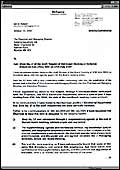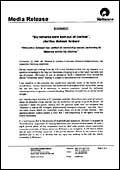|
To
an outsider, untangling reliance group's shareholding structure
will be a mammoth task. Apparently, a web of some 1,400 privately-owned
companies holds shares on behalf of the promoters. The identity
of these companies is not publicly known. What the Reliance Industries
Ltd. (RIL) annual report reveals is that there are 14 companies
that amount to "persons acting in concert" for the Ambani
family, and these hold 34.04 per cent of RIL. These 14 companies
in turn could be held by dozens of other privately-held outfits,
creating a complex maze of shareholding. Says Vinod Jain, a Delhi-based
chartered accountant and a former member of ICAI's governing body:
"It will be a complex web of crossholdings in hundreds of companies.
Only the person who has planned it will know who owns what."
Then there is the Petroleum Trust, which holds
7.5 per cent stake for the beneficiaries (read: the Ambani family)
in RIL, while the promoters directly hold only 5.13 per cent. That
means the total promoter holding, direct and indirect, in RIL is
46.67 per cent. The Ambani family or RIL, though, is by no means
an exception. Almost all Indian business families prefer to hold
their shares through such private investment companies. The practice
gained currency in the 1970s and 1980s, primarily to avoid wealth
tax. Although the central government abolished wealth tax on productive
assets (shares qualify as productive assets) some four years ago,
the practice has continued. (Long-term capital gains tax was abolished
last year, and dividend income was made tax-free in the hands of
the recipient, further diluting the case for a complex shareholding.)
How do the family trusts work? These are personal
benefit trusts, not public charitable trusts, and they hold shares
for the promoters. Typically, the trustees are people loyal to the
promoter family, while the beneficiaries would be the promoters
themselves. The personal benefit trusts, however, have to pay taxes
at maximum rate of 30 per cent. Again, it's not just the Ambanis
who have family trusts. Almost all business families have one or
several, and sometimes they can play a crucial role in ownership
control-like in the ongoing Birlas-vs-Lodha battle over the assets
of late M.P. Birla.
| STRANGE ESTRANGEMENT? |
 |
 |
|
|
| Quick volte-face: Maybe
Mukesh said that too early |
Rumours of a rift between Mukesh
and Anil Ambani had first surfaced more than two years, but
except for minor slip-ups (like Anil not showing up for the
launch of Reliance Infocomm services), the brothers made no
public display of their growing estrangement. Indeed, when a
reporter from The Economic Times asked Mukesh if a split between
the brothers was a possibility, Mukesh famously replied, "Anil
is like a son to me", meaning that there was no love lost
between the two and that a separation would never happen. Now,
of course, things have proved him terribly wrong, with the younger
Anil preparing to take Mukesh, the Chairman of Reliance Group,
to the courts over a settlement that the former thinks is due
to him.
Assuming the fight between the brothers is just a little
over two years old, what could have caused a sudden degeneration
in relationship? There are a number of stories floating around.
One of them says that Anil had started to spend less and less
time over the affairs of Reliance Industries, making it easy
for Mukesh to sideline him (Anil's shift to Reliance Energy
was seen as an evidence of it). Another one speculates that
Mukesh was unhappy with his brother's growing public profile
and alignment with the Samajwadi Party duo of Amar Singh and
Mulayam Singh Yadav, both considered arch-enemies of the Congress
Party. By diluting Anil's role in the affairs of Reliance,
Mukesh, it is said, could be trying to stay in the good books
of the Congress-led UPA government.
Whatever may be the reasons of estragement, a reconciliation
between the two brothers seems unlikely, although there's
no dearth of people who think otherwise. Indeed, had one been
possible, it would have been made even before Mukesh made
his public statement about "ownership issues". When
you have Rs 1,00,000-crore empire at stake, it's cold logic,
and not fuzzy emotion, that dictates each and every move.
|
If there is little tax advantage to having dozens
of investment companies, why do promoters continue to have them?
Because besides holding shares in the flagship, these companies
trade in them. That's not illegal, except that it gives promoters
a lot of scope for stock manipulation. But employed well, these
investment companies can be of crucial help. For one, they can help
simplify inheritance. "Planning succession becomes very easy.
You can simply split the investment companies among the heirs,"
says Umesh Khaitan, Managing Partner of the Delhi-based law firm,
Khaitan & Jayakar, Sud Budhiraja & Vohra. Khaitan should
know. He has worked on settling disputes for Delhi-based business
groups like Ranbaxy, Apollo Tyres and the Modis.
But there is a flipside. The control of these
companies and trusts can become a bone of contention if one of the
heirs decides to exert control or act dirty. Corporate India (read:
business families) is full of such examples, as most of the family
disputes arise because of such issues. For instance, the person
in charge (one of the main promoters) can discreetly change the
shareholding pattern of these holding companies by putting in personal
money, or by changing the board of directors. Says Khaitan: "All
promoters have to be on the ground and vigilant so that somebody
else does not actually take away the control." Concurs Rajiv
Memani, Country Managing Partner and CEO of Ernst & Young: "It
becomes very complex. Half of the family members have no clue."
The plight of ordinary shareholders, then,
is easily imagined. Take the unlisted Reliance Infocomm, for example.
RIL is said to own 45 per cent of Infocomm's equity, and RIL promoters
(in this case, Mukesh Ambani specifically) the remaining 55 per
cent. But since Infocomm is not required to publish its accounts
or even append it to RIL's since its neither listed nor majority-owned
by RIL, nobody-except, of course the promoters-knows how much the
family and its associates paid for acquiring the 55 per cent stake.
If they paid as much as what RIL did for its share (which is Rs
12,167 crore for a 45 per cent stake), then the promoters would
have had to cough up a whopping Rs 14,500 crore for their 55 per
cent share.
However, since law allows companies to issue
preferential shares priced lower or higher than either the prevailing
stock market price or price paid by other shareholders, it is possible
that Infocomm may have adopted that route. But in the absence of
publicly available information on Infocomm it's hard to say anything
conclusively. The shareholders, however, are free to demand information
from RIL, and it is conceivable that some day some of them may actually
do.
|
